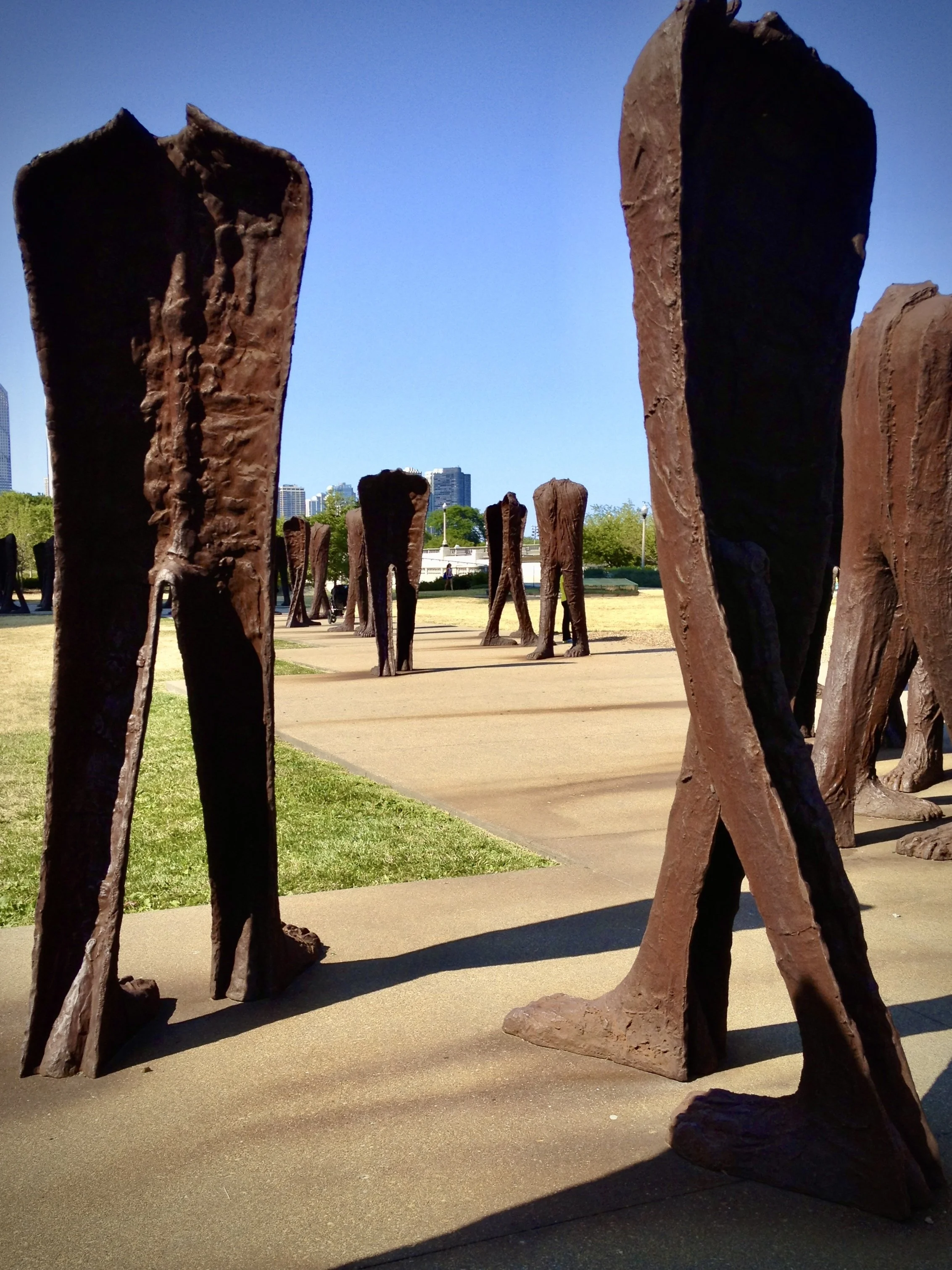But...She Won
Agora by Magdalena Abakanowicz in Chicago’s Grant Park. There are many interpretations for this installation, but I see the many paths people can choose to take.
Reading Time: About 4 Minutes.
September 1993. I was finishing up my internship at a country radio station in a town so small, the nearest cultural landmark was a Super Walmart. It was my last chance to graduate by the end of the year—and the clock was ticking.
The summer before, I’d operated cameras for the evening news at a TV station back home in Texas—minimum wage, late nights, deeply formative—but I hadn’t filed the paperwork that made it “real” to my college. So here I was: still not graduated, still not fully adult, with a growing stack of student loans and exactly one shot left at turning this radio gig into a degree.
Now, I should mention: I went to a Christian university. And at my university, integrity was kind of our thing. We talked about it the way other colleges talked about keg parties and tailgates. We were the light of the world. Fluorescent. Unwavering. Slightly buzzing. I was pretty sure if I just did the right thing—told the truth, worked hard—life would reward me with glowing job references and maybe a signing bonus.
So, when my boss handed me the reins to organize the station’s annual talent show at the county fair, I took it as a sign. Not from God, necessarily—but definitely from Career Services. This was my shot to prove I could run something important. My boss didn’t want to deal with logistics. He wanted to show up, grab the mic, and be the face of it all.
Perfect. I’d do the work, he’d do the schmoozing, and together we’d make country radio history. (Or at least create a fun night at the fairgrounds.)
I worked my tail off. I booked talent, coordinated volunteers, scheduled judges, printed programs—probably invented Excel in the process. I even made sure the emcee had a clipboard and a functioning mic—because that’s who I was now.
And somehow… it worked.
The show was a hit. A local woman closed the night with a performance so good, I briefly considered quitting school and becoming her agent. She hit her final note, and the crowd exploded into a standing ovation that went on way longer than anyone expects from folding-chair seating.
Backstage, I was riding the high of a job well done when my boss waved me into a dressing-room trailer. He looked serious. The kind of serious that usually means someone clogged the porta-potty or forgot the giveaway T-shirts.
But no.
He held a stack of index cards—the judges’ score sheets. The results were in. The woman had won. By a mile. Maybe a mile and a half.
Then he looked at me and said, “What do you think—should we give it to my buddy instead? He could really use the prize money.”
I wish I could say I responded with righteous indignation and a thunderclap of no. I wish I could say I marched out there, snatched the mic, and announced the real winner myself.
But what I did was: panic.
All my moral certainty evaporated like a small rain puddle in the summer heat. What if he failed my internship? What if he called my school and said I was difficult? What if, instead of a reference letter, I got a reputation—and not the good kind? Could I even afford to retake a semester? (Spoiler: No.)
This was the kind of ethical dilemma they prepped us for in chapel—but somehow it never involved a grown man with an eraser and a side hustle in nepotism.
I told myself maybe it wasn’t really my decision. Maybe if I just looked at the floor, it wouldn’t technically be my lie. I could be an innocent bystander to injustice.
But then I thought about that woman. I’d watched her pour her soul into that song. I’d seen the crowd leap to their feet. I’d read the cards. The truth was right there. Ink on paper. No interpretation needed.
And still, I wanted to disappear. I wasn’t brave. I wasn’t bold. I was a deeply anxious college student who just wanted to graduate and move to a city where nobody knew my GPA and bookstores stayed open past 8.
So when I finally said something, it came out like a balloon slowly deflating: “But… she won.”
That’s it. That was my stand. A squeak in a sea of silence.
He stared at me. His expression said: You have ruined everything. He turned to the cards with a Sharpie like a man about to perform moral surgery. Then—bam!—someone pounded on the trailer door: “You need to announce the winner!”
And he left.
I didn’t follow. I just stood there in the trailer, waiting to hear what lie—or truth—he’d chosen.
To my shock, he announced her name.
She won.
And just like that, the night ended. But the magic didn’t return. Something had cracked. The belief that doing good work would naturally lead to good outcomes… was gone. Or at least shaken.
But another thought crept in too.
I didn’t slay a dragon. I didn’t even raise my voice. But I told the truth, and nobody exploded. So maybe that was enough. At least for one night at the fair.
